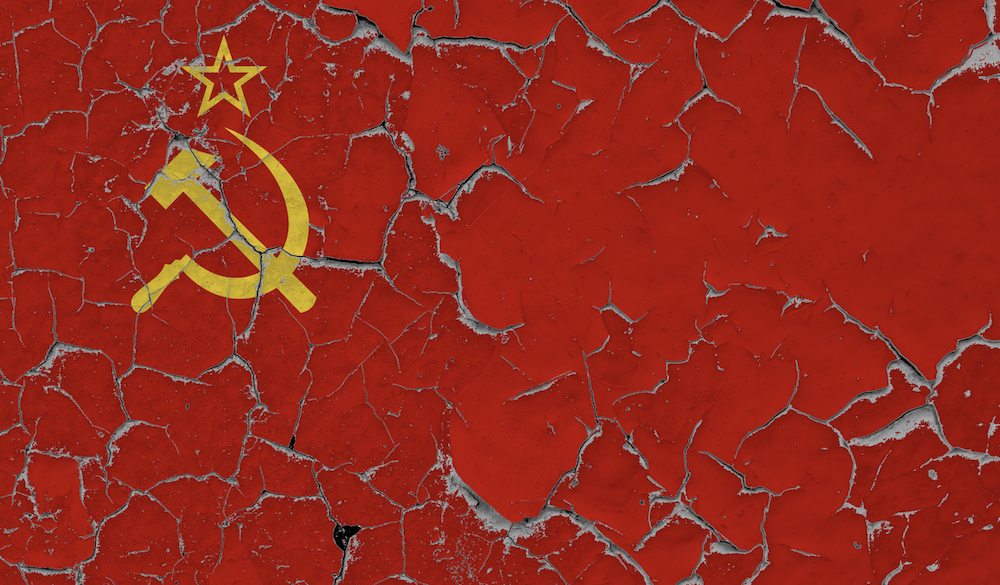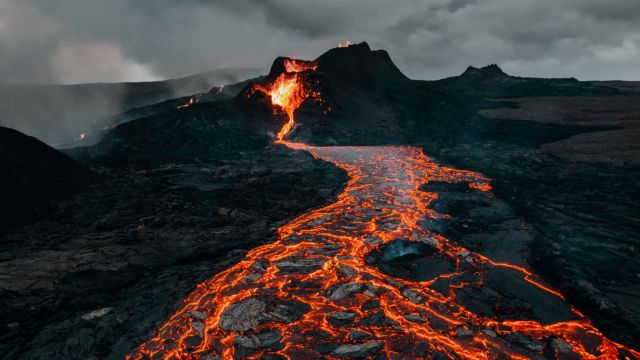Why Mikhail Gorbachev let the Soviet Union dissolve quietly into history

- The Soviet Union dissolved itself quickly and peacefully in 1991, ending what was arguably one of the most remarkable political experiments in human history.
- In the years preceding the dissolution, Mikhail Gorbachev had several opportunities to restore power to the Soviet Union, both domestically and abroad.
- However, Gorbachev’s commitment to two policies — glasnost (openness) and perestroika (economic reconstruction allowing marketization and privatization) — led him to conclude that dissolution was the preferable option.
Excerpted from The Rise and Fall of the Neoliberal Order: America and the World in the Free Market Era, written by Gary Gerstle and published by Oxford University Press.
As late as 1989, the Soviet Union was one of the world’s two superpowers. It dwarfed all other land empires in size. It possessed a formidable nuclear arsenal and the largest army on the planet. Its power and influence extended well beyond its borders into Vietnam in East Asia, East Germany in western Europe, Iraq and Syria in the Middle East, portions of southern Africa, and Cuba and Central America in the Western Hemisphere. Internally, across the seventy-plus years of its existence, it had engaged in what historian Ian Kershaw has called “the most remarkable political experiment in modern times,” replacing capitalism with communism, private property with publicly run enterprises, and homo economicus with “Soviet man.” For most of that period, its power, its communist ideology, its atheism, and its appeal to the Third World struck fear in the hearts of US policymakers. Millions of Americans regarded the communist system as an existential threat to their way of life. In their eyes, to be a communist in the post–World War II era was to be an enemy of the American state, a mortal threat to America’s tradition of liberty and free enterprise, and a violator of all that was decent and moral in American life.
And then, in December 1991, in a move almost unprecedented in recorded human history, the Soviet Union, communism’s home base, dissolved itself quickly and peacefully. Several former Soviet republics became independent nations and the rest banded together in a new polity called the Commonwealth of Independent States (CIS). Whatever CIS was, it was not communist. Before it swept itself into the dustbin of history, the Soviet Union had freed its colonies in Eastern Europe with hardly a shot being fired. Without a fight, it gave up its share of Berlin—the precious prize awarded the Red Army for its World War II years of life-and-death struggle against the Nazi war machine. A young KGB colonel stationed in Dresden at the time would come to regard the Soviet Union’s voluntary retreat from Germany and Eastern Europe and its self-dissolution as the most shameful and humiliating moment in Russian history. His name was Vladimir Putin.
Putin desperately wanted the Soviet Union to fight for its life at all costs. Across history, this is what most empires in decline had done. Some went to war. Others tried to save themselves through internal reform, and then repressed their subjects when the reforms unleashed forces of change that no one had anticipated. The Soviet Union could have survived in this manner for decades beyond 1991, especially since no one, outside the mujahideen in Afghanistan, really wanted to fight it. With 500,000 troops in Eastern Europe as late as 1989, and tens of thousands of nuclear warheads spread throughout the country and capable of reaching any destination on earth in an interval ranging from minutes to hours, the USSR still possessed formidable capacity to rain mayhem and destruction on its enemies.
The Soviet Union had been ailing in the 1970s and 1980s, to be sure. It had had trouble keeping economic pace with the capitalist West, especially in delivering to its people the quantity and quality of consumer goods that were becoming the hallmarks of successful societies. Moreover, matching Ronald Reagan’s military expansion and budget and developing its own anti-nuclear shield to negate the impact of America’s Strategic Defensive Initiative strained the Soviet Union’s finances and its technological capacity. Technical advances were stymied not by a shortage of scientists (the Soviet Union had plenty) but by the state’s refusal to allow the free flow of information and innovation among them that was required for advances in the IT revolution. At a time in the 1980s when the number of personal computers in the United States was crossing the 25 million threshold, the Soviet Union possessed a paltry 200,000, less than 1 percent of the American total.
The Soviet Union was also undergoing a leadership crisis. It had no effective mechanism for transferring power to a new generation. Its ancient leaders in the 1970s and 1980s hung on as long as they could,
with some of the last ones—Leonid Brezhnev and Yuri Andropov in particular—becoming “dead men walking.” In Andropov’s last months of life in 1985, the only organ of his body that seemed to be functioning properly was his brain. Mikhail Gorbachev, the man who succeeded Andropov in 1985, had demonstrated an uncanny ability to interpret the wishes of bosses who could barely issue orders anymore, an ability that helped him to win their favor and to position himself to succeed them as premier of the Soviet Union and the general secretary of the Soviet Communist Party.
Gorbachev was a party insider, steadily and cleverly climbing through the ranks. Somehow, he had kept alive a genuine faith in socialism, one of the last in top Soviet leadership echelons to do so. An
heir to the Khrushchev semi-revolution of 1956, Gorbachev ardently believed that communism really could be reformed and socialism with a human face enacted. This stance informed his embrace of the reform policies of glasnost (openness) and perestroika (economic reconstruction allowing marketization and privatization) to reinvigorate the politics and economy of his nation. And when these policies triggered unexpected consequences—the eruption of secessionist nationalisms and popular democracy in both the Soviet republics and the Soviet satellite colonies in Eastern Europe—Gorbachev repeatedly declined to curb reform or to unleash repression.
Gorbachev could have pivoted toward the latter in 1989, as his Chinese communist counterparts were doing at precisely that moment when they attacked the Chinese democracy movement assembled in
Beijing’s Tiananmen Square with tanks, troops, and bullets. Surveying his country’s chaotic state in 1989, the Chinese premier, Deng Xiaoping, concluded that the Chinese ruling elites would successfully manage the transition from communism to capitalism only if they repudiated aspirations for democratic reform. Deng was brutally practical in his determination to preserve the power of the Chinese Communist Party at all costs. Gorbachev was not. The last of the socialist utopians, Gorbachev had decided that if socialism could not be saved in a democratic manner, then it did not deserve to be saved at all.
That conviction explains why Gorbachev did not act on several opportunities between 1989 and 1991 to restore the power of communists within his nation and that of the Soviet Union in world affairs. He could have sent his country’s tanks into Eastern Europe in 1989 to crush popular revolts against communist rule there, as his predecessors had done in 1956 in Hungary and 1968 in Czechoslovakia. He did not. He also could have generated mischief for the West in 1990 and 1991 when America, with United Nations backing, landed a massive force in Saudi Arabia to push Iraq’s leader Saddam Hussein out of Kuwait and secure that small country’s petroleum reserves for western Europe, Japan, and the United States. Gorbachev could have threatened military retaliation in 1990 when the West broke its pledges first to keep a reuniting Germany out of NATO and then to keep NATO from encroaching on the Soviet Union’s western border. As late as August 1991, a group of high-ranking Soviet officials showed up at Gorbachev’s Crimean hideaway to plead with him to crack down on the country’s democratic reformers and to re-establish communist authority. Had he done so, thousands of elite Soviet officials, military and civilian, backed by hundreds of thousands of troops, would likely have rallied to his side. But again, Gorbachev declined to take any action that would undercut glasnost and perestroika. An attempted coup occurring without his support failed. Shortly afterward, Gorbachev resigned from office. The Soviet Union, one of the most powerful empires the world had ever known, slipped quietly into history.





